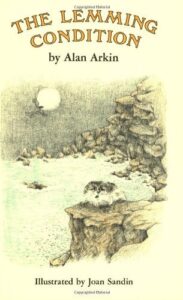 A book well-worth rereading and a keeper in my personal library is The Lemming Condition by Alan Arkin, published in 1976. It came into my hands again when COVID restrictions led me (like many others) to do some reorganizing.
A book well-worth rereading and a keeper in my personal library is The Lemming Condition by Alan Arkin, published in 1976. It came into my hands again when COVID restrictions led me (like many others) to do some reorganizing.
In The Lemming Condition, the time is nearing for the lemming community to take the great leap—to run to the cliffs and keep going, falling into the waters below. Why? Because that’s what lemmings do. Arkin explores what happens when one young lemming asks, “Can lemmings swim?” What happens when one lone lemming says, “I don’t want any part of this.”
Arkin’s slim, brilliant allegory has always been a source of hope for me, hope and belief in the power of the individual living in what sometimes feels like a society run amok. I’m a strong advocate for independent thinking, which is one reason I admire Lewis Michaux, my great uncle and the subject of two of my books. Like Lewis, when I have the ear of young people, I encourage them to think for themselves, to ask questions, to follow their own paths. I like to say, “Pack your own wagon and be careful about what wagon train you hook up with.”
One way to become a free thinker, of course, is through reading, which is why Lewis created his Harlem bookstore. He believed books change lives — books like The Lemming Condition. Consider a young reader who, in this reading moment, sees the wrongness of allowing something senseless, something hurtful, to continue. One lone reader who suddenly realizes he’s uncomfortable with the train he’s joined and decides to be the single lemming who alters course. One lone reader with the courage to say, “This isn’t me.”
In these turbulent times, Arkin’s book should be required reading. Here are some other cautionary tales worth revisiting in these uncertain, sometimes scary, days:
1984 by George Orwell (1949)
Animal Farm by George Orwell (1945)
Lord of the Flies by William Golding (1954)
Terrible Things: An Allegory of the Holocaust by Eve Bunting (illlustrated by Stephen Gammell) (1989)
